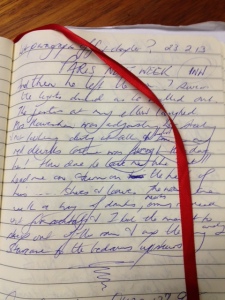 Yes, I know, I’ve just finished my manuscript The Grey Silk Purse and have made my first submission but I’m nervous. As a diversionary tactic I’m researching a new novel. I even have a title – Paris Next Week.
Yes, I know, I’ve just finished my manuscript The Grey Silk Purse and have made my first submission but I’m nervous. As a diversionary tactic I’m researching a new novel. I even have a title – Paris Next Week.
I’m at the absolute beginning which is always exciting. I have a vague idea about the plot and I have the two main locations – Sydney and Paris in the 1920s. I’ve just picked up my first book to read. It is Women, the Arts, and the 1920s in Paris and New York edited by Kenneth W. Wheeler and Virginia Lee Lussier and even after a quick glance it looks like the perfect ticket. The ship hasn’t docked yet but I already have a list of books to take on the voyage and some of these books may even help determine aspects of characterisation and plot.
That’s the fun of researching. You read to learn about something new. It may be Serbia in 1917, Port Stephens in 1942, England in the middle ages and as you find out more information you often stumble across an amazing fact that alters your writing completely.
Originally at the very start of The Grey Silk Purse I had a vague idea that my main character would be a nurse in Salonika, although something nagged at me that this profession wouldn’t suit my Miss Summerville. I began reading about the Australian nurses working there during WWI and discovered that other Australian nurses were working in Serbia, of all places! When the Australian troops were sent to France a lot of our girls were sent to the little known Macedonian Front. I began to read about Serbia in earnest and very quickly stumbled upon the wonderful Olive Kelso King who drove an ambulance. That was more like it. This is what my girl would have been doing!
Through reading I discovered not only the beautiful and very important location Lake Ostrovo for my novel but what my character did during the last year of the war. I read six memoirs of women involved in the Scottish Women’s Hospital and I drew from their knowledge to set the scenes for the most crucial chapters in the book – the why and wherefore of life in a field hospital. I can’t imagine the completed manuscript without all these facts now common knowledge to me. I don’t reveal them all of course but they are crucial to a lot of decisions I made (or my character makes) during the course of her war work.
I now have an even greater admiration for the women who were involved in this terrible conflict. We often talk about Post Traumatic Stress Disorder. We can now see that returned soldiers from all major offensives were victims but how did the women cope? We know the men either ended up in asylums or drank excessively after both world wars but what happened to the VADs, the ambulance drivers and the nurses when they returned to civilisation? That question is the driving force of the novel and it’s one I really couldn’t have asked without at least the basic facts behind me. So happy research reading. You’ll never know what you may stumble upon!

